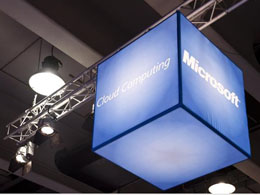
Microsoft Partners Up with Consensys to Introduce Blockchain-based Services
After being one of the first big multinational companies stepping into bitcoin, Microsoft is now, it taking its first steps into the blockchain technology. Marley Gray, the director of technology strategy for financial services at Microsoft's at Times Square-based technology center revealed there was a growing demand for this kind of blockchain tools among the company's customers and the company was attracted to Ethereum by its flexibility. While bitcoin was designed with the single purpose of being a currency, Ethereum presents a wider range of applications. Microsoft signed a partnership....
Related News
Microsoft's Azure blockchain and its blockchain-as-a-service endeavor is now adding three new partners to its blockchain-toolkit platform, with one of them even providing a Bitcoin data service. Soon after launching its blockchain-based service for customers of its cloud platform Azure last month, Microsoft has been ramping up its partners who will serve as collaborators and service providers. Last week, Microsoft announced a new partnership with Ripple, the interledger protocol to its blockchain toolkit. In a new blog post by Marley Gray, Director of Technology Strategy for Financial....
Microsoft has announced that it is collaborating with Blockstack Labs, ConsenSys and developers across the globe on an open source, self-sovereign, blockchain-based identity system that allows people, products, apps and services to interoperate across blockchains, cloud providers and organizations. The United Nation's Sustainable Development Goals include giving everyone a legal identity by 2030. As a first step, the U.N. wants to develop scalable identity systems by 2020. The inaugural "ID2020 Summit ‒ Harnessing Digital Identity for the Global Community," held at the United....
Microsoft has announced a strategic partnership with Brooklyn-based startup ConsenSys amid its launch of a cloud-based blockchain platform on Tuesday, to assist financial institutions and banks to experiment with bitcoin's underlying technology, the blockchain. The Seattle-based company will offer Ethereum Blockchain as a Service (EBaaS) on Microsoft Azure to enable Enterprise and institutional clients to build Ethereum blockchain and Smart Contract-based applications with pre-built tools and templates. The platform will be available to banks and insurance companies already registered to....
Microsoft has partnered with Consensys, a blockchain startup focused on Ethereum technology, The Wall Street Journal reports. Through the partnership, customers of Azure, Microsoft’s cloud-based business service, will have access to tools that will allow them to experiment with and build cloud-based blockchain applications, from securities trading to cross-border payments to corporate accounting, and offer them to their own customers. ConsenSys was founded in October 2014 by Joseph Lubin, who co-founded the Ethereum Foundation with Vitalik Buterin. Based in Brooklyn and staffed by 60....
Microsoft is partnering with ConsenSys, an Ethereum-coder collective, and Blockstack Labs, an application stack for decentralized, server-less apps secured by the blockchain, in trying to improve the state of the millions of people – mostly children – who face severe challenges from having no legal identity. The partners are engaged in a long-term project to employ blockchain-based solutions to the challenge of legal identity, Microsoft noted in a blog on its Microsoft Azure website. Microsoft Azure is an open cloud-computing platform. The identity issue was explored during the recent....





